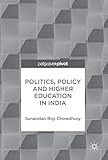Politics, Policy and Higher Education in India [electronic resource] / by Sunandan Roy Chowdhury.
Material type: TextPublisher: Singapore : Springer Singapore : Imprint: Palgrave Macmillan, 2017Description: X, 163 p. online resourceContent type: text Media type: computer Carrier type: online resourceISBN: 9789811050565Subject(s): Education | International education | Comparative education | Educational policy | ducation and state | Educational sociology | Higher education | Education and sociology | Sociology, Educational | Education | Educational Policy and Politics | Higher Education | Sociology of Education | International and Comparative EducationAdditional physical formats: Printed edition:: No titleDDC classification: 379 LOC classification: LC8-6691Online resources: e-book Full-text access
TextPublisher: Singapore : Springer Singapore : Imprint: Palgrave Macmillan, 2017Description: X, 163 p. online resourceContent type: text Media type: computer Carrier type: online resourceISBN: 9789811050565Subject(s): Education | International education | Comparative education | Educational policy | ducation and state | Educational sociology | Higher education | Education and sociology | Sociology, Educational | Education | Educational Policy and Politics | Higher Education | Sociology of Education | International and Comparative EducationAdditional physical formats: Printed edition:: No titleDDC classification: 379 LOC classification: LC8-6691Online resources: e-book Full-text access | Item type | Current library | Collection | Call number | Copy number | Status | Notes | Date due | Barcode |
|---|---|---|---|---|---|---|---|---|
| E-Books | MEF eKitap Kütüphanesi | Springer Nature | LC8 -6691 (Browse shelf (Opens below)) | Available | NATURE | 1419613-1001 |
Introduction -- Brahmin Language, Hindu Growth: Politics and Power of English Language in India -- Western University, Indian Nationalisms -- Cold War to Brand Wars: Global Processes, Developmental Visions and Indian Higher Education -- Class Struggles in Class Rooms: Conflict, Politics and the Indian University -- Elite Institutions, Dismal Development: Poverty of Indian Higher Education -- Conclusion: Towards A Democratic Higher Education. .
Considering the evolution of Indian higher education policy from British colonial rule to modern day India, this pivot examines key policy issues in fields as diverse as language, nationalism and economic development. Focusing on India's relationship with the world at large and the state of class conflict in India's universities, it assesses the country's politics as they have impacted education policy, as well as the state of higher education and of universities in India. The book contends that India's elite and power-stream have developed a higher education policy that has successfully catered to the creation and reproduction of a tiny economic elite which excludes the largest sections of higher education institutions and society. This skewed policy and its concomitant development has led to India remaining a pygmy nation when it comes to living standards or innovation in natural and social sciences. Through cutting edge interdisciplinary research, this pivot offers an insightful addition to the debate on higher education thinking, in India and further afield, across the realms of politics, policy and philosophy.
5
